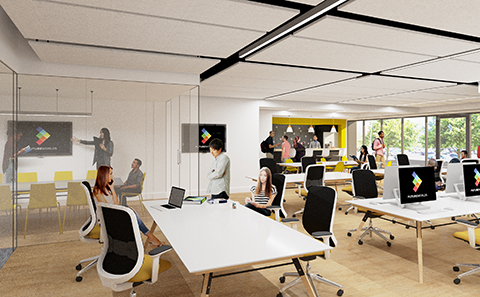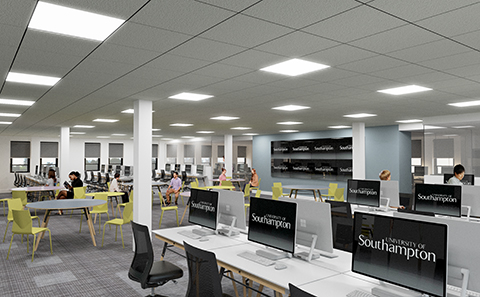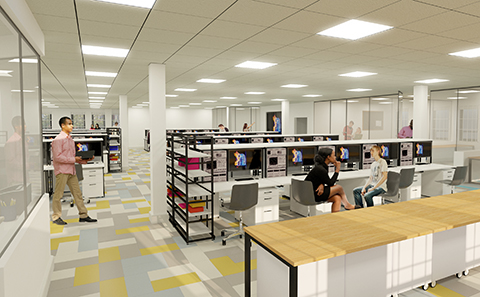
Startup Accelerator
Find out about the Future Worlds Startup Accelerator

Find out about the Future Worlds Startup Accelerator

Find out about our new Software Projects Laboratory

Find out about our new Hardware Projects Laboratory
Electronics and Computer Science (ECS) student Matt Price has been awarded an Engineering Leaders Scholarship from the Royal Academy of Engineering (RAEng).
The programme helps ambitious and inspiring undergraduates accelerate their personal development and become role models for the next generation of engineers. Southampton Civil Engineering student Thomas Edwards was also a successful in the latest scholarship cohort.
Second year MEng Electronic Engineering student Matt has demonstrated much leadership potential in his youth, including having become the youngest ever team manager in the international World Solar Challenge in 2015, been Head Boy and recently elected Vice President of the University Football Club.
He plans to use the RAEng funding to undertake leadership training and gain global technological experience over the next three years and take a sample of his solar challenge technology back into schools.
âI hope this scholarship will help me develop the qualities of a good leader while inspiring others to get into engineering,â? Matt says. âIn particular, I want to develop the emotional intelligence and strong communication skills that are important for getting the best out of brilliant minds in a team. Iâm thankful to the RAEng for selecting me from a very competitive process.â?
Matt was awarded an Institution of Engineering and Technology (IET) scholarship in his first year and serves in the committee for a Southampton IET on Campus group.
In 2015, he competed with Ardingly College in the World Solar Challenge, a 3,000km journey from Darwin to Adelaide in Australia using a self-constructed solar-powered vehicle. Matt led a team of 40 students in his final year and piloted the car to sixth place in the Cruiser Class race, finishing ahead of universities from Singapore and Iran.
âI have been interested in engineering for some time and was drawn to the University of Southampton because of the amount of practical work there is during the course here,â? he adds. âIâm also really interested in the Universityâs reputation in the field of photonics and thatâs something I want to take advantage of more moving forward.â?
As part of his MEng Electronic Engineering course, Matt has taken part in a group design module developing problem-solving and team-working skills. âWe were challenged to create a connected device for Internet-of-Things and smart homes,â? he explains. âWe came up with the idea for a smart plant pot and garden assistant called BioBloom that would measure the temperature, humidity and soil moisture of indoors plants.
âUsers could remotely view the data and there was a connected water reservoir that would automatically water the plants as needed, alongside other environment control features. This was a fun and interesting project to design and build something which could potentially be a real product. I am always fascinated and inspired by innovation, within the ever-evolving field of electronic engineering.â?
Nanopore flow characterisation is becoming an increasingly important with applications in nanotechnology, environmental sensing and nanotribology. At present, the standard method of measuring flow through a nanopore is by measuring the ion current. However, many liquids (including deionised water) have conductivities that are so low that measuring ion current becomes unfeasible. In this project, alternatives to ion current measurement will be explored using a combined micro-electro-mechanical (MEM) and microfluidic approach. The nanopore flow measurement platform will be used to study the fundamental effect of external stimuli e.g. electric field and/or temperature, on the properties of liquids (e.g. water, alcohol, ionic liquid) near a surface. In the presence of such stimuli, a change of phase or viscosity could occur and this would enable ââ¬Åsmartââ¬? surfaces to be constructed with controlled flow of liquids across a nanopore. In order to relate the microfluidic data with underlying molecular mechanisms, atomic force microscopy (AFM) will be used to measure the local viscosity of the liquids near a surface, and to observe how the viscosity changes with external stimuli (applied electric field, temperature).
This PhD project is part of a collaboration between the University of Southampton and A*STAR Singapore Institute of Materials Research and Engineering (IMRE). The successful candidate will spend two years in Singapore and two years in Southampton, UK. Funding is available to strong candidates with British or EU citizenship. The ideal candidate should have at least an excellent first degree in any field of engineering or applied sciences (minimum of upper second-class honours), and be proficient in English.
If you wish to discuss any details of the project informally, please contact Dr Suan Hui Pu, Mechatronics Research Group, Email: suanhui.pu@southampton.ac.uk or Dr Harold Chong, Sustainable Electronics Technology Group, Email: h.m.chong@southampton.ac.uk
Electrical and Electronic Engineering (EEE) and Computer Science at ECS (Electronics and Computer Science) both continue to perform well in the 2019 Guardian University Guide, with EEE retaining overall second place and Computer Science jumping from 16th to eighth place in the subject rankings.
For EEE, this represents the tenth consecutive year in the UK top three, and Southampton top the table for course satisfaction in the subject with a score of 99.0 out of 100.
Professor Paul Lewin, Head of ECS, says: âWe have a proven record of delivering high quality teaching in the areas of Computer Science and Electrical and Electronic Engineering and this is reflected in terms of student satisfaction as well as our standing in league tables. Our students benefit from access to world-leading resources as well as the hard work and dedication of all ECS staff engaged in education.â?
The Guardian University Guide ranks 121 UK institutions and focuses on undergraduate study and experience. Rankings are based around criteria of entry tariffs, student satisfaction, graduate prospects, student-staff ratio and university spend per student.
The University of Southampton rose 12 places to be ranked 23rd overall in the 2019 guide. The improvement comes a month after the Universityâs return to the top 20 in the 2019 Complete University Guide, in which both EEE and Computer Science were placed in top ten positions.
Professor Bashir Al-Hashimi, Dean of Physical Sciences and Engineering, adds: âEEE is consistently ranked among the best departments in the UK and this outstanding result reinforces that the University and ECS provide the highest quality educational experience and training to our students. I am also delighted that Computer Science and Physics are among the top 10 in their disciplines, which is a fantastic achievement. Such consistent results are testament to the expertise and commitment of our staff as well as the leadership at Department and Faculty level.â?
View the 2019 university league tables in full via the Guardian University Guide website.
The design of analog and radio-frequency (RF) circuits in CMOS technology becomes increasingly more difficult as device modeling faces new challenges in deep submicron processes and emerging circuit applications. The sophisticated set of characteristics used to represent today's "digital" technologies often proves inadequate for analog and RF design, mandating many additional measurements and iterations to arrive at an acceptable solution. Two fully funded PhD projects are available to address some of these issues. The first project looks at novel circuit design techniques to harden embedded SRAM cells and other circuits to transient and dose rate effects as well as total ionising dose (TID) using circuit design techniques. The second project will explore in-depth analysis of the capacitor non-idealities limiting the performance of the state of art numerical converters. The main areas of investigation focus on the capacitor mismatch drift and dielectric absorption. Both projects will use state-of-the art design tools, fabrication of the ICs on the latest deep submicron technology nodes, and facilities at the University of Southampton and the companies for design and device characterisation.
PhD studentship with Analog Devices https://www.jobs.ac.uk/job/BJT662/phd-studentship-development-of-improved-capacitor-structures-for-data-converters
PhD studentship with AWE Ltd https://www.findaphd.com/search/ProjectDetails.aspx?PJID=97375
ZendTo is known within the University of Southampton as the "Dropoff" service.
It provides a very quick and easy method of transferring (potentially very large) files securely to anyone in the world, if you are a member of the University, and to anyone in the University if you are not a member of it. All you need is the email address of the recipient(s): no magic passwords or usernames.
It is widely used throughout the world by large organisations including the US Navy and the French government, in addition to multiple universities and companies.
First year Computer Science students Kajetan Champlewski and Dan Trickey secured £30,000 for their Questioneer startup at a Dragonsâ Den-style investment event with the University of Southamptonâs Future Worlds incubator.
The ambitious student entrepreneurs have innovated a maths revision tool that can generate an infinite number of questions and provide feedback, offering a digital alternative to a personal tutor.
Questioneer was one of six student startups pitched in front of four angel investors and a packed live audience at the University of Southampton Studentsâ Union on Saturday.
Kajetan and Dan have developed their business during BSc Computer Science degrees and are planning a formal launch of their product in September.
âI had the idea for replacing the numbers in revision questions near the end of my A-Levels, but I didnât really know how to do it practically,â? Kajetan explains. âI met Dan on the Space Cadets programme at the university and together we developed the idea of turning questions into scripts.
âStudents currently have little choice but to trawl through past papers to revise, with little or no feedback. We turn past papers into infinite searchable question banks, complete with worked solutions and feedback on topics. Revision should be about improving your maths skills, not searching through long documents, and thatâs what we provide.â?
Dragon investors Chris Broad, Apple Director of Sales Contracting EMEIA, Andrew Doe, serial digital entrepreneur and founder of confetti.co.uk, Sonja Lami, angel investor and Insight Investment Fund Manager, and Nick Lawton, Chairman of the Lawton Communications Group, interrogated and negotiated on stage with the entrepreneurs. Kajetan and Dan secured £30,000 of investment from Andrew, Sonja and Nick.
Southampton Computer Science graduate Tunde Alao also secured £50,000 on stage with co-founders Landon Vago-Hughes and Boateng Opoku-Yeboah for their Cluttr app, a private social network with features for shared houses. Tunde graduated in 2017 and runs a YouTube channel for iOS and Android app development tutorials which has over 14,000 subscribers and 2.3 million views.
First year Aeronautics and Astronautics student Connell McLaughlin was pledged £100,000 by four investors â including a surprise last minute offer by phone â in a dramatic finale to a pitching event that was already breaking records for the on-campus incubator. Connell has created Route Reports, an embedded sensor system and web-based dashboard that is detecting and reporting hazards like potholes and overhanging branches on public transport.
Fourth year Electronic Engineering student Dylan Grey showed great promise with his online gift service BOON, and Mathematical Studies and Actuarial Science students Louis Dykes and Yacob Siadatan pitched well for their business Airscape, but both start-ups were deemed too early for investment at this stage in their development.
Dr Reuben Wilcock, Future Worlds Director, says, âItâs been great to see an infectious entrepreneurial culture building on campus in recent years which now seen over £450,000 pledged on-stage to student startups at our four annual pitching events. The student entrepreneurs really impressed the investors on Saturday with their passion, professionalism and presentation, and it will be exciting to see what their fledgling businesses can achieve in the coming years. Two startups from the 2017 showcase are now valued at over £1m and will be based in Silicon Valley and London from this summer. Future Worlds will be mentoring the startups as they continue their entrepreneurial journeys alongside their studies and strive to impact society with their innovations.â?